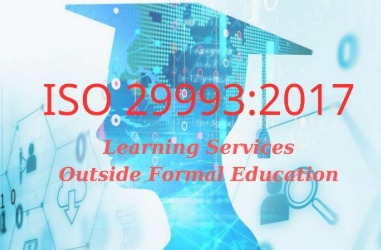ISO 29993:2017 – Enhancing the Quality of Learning Services Outside Formal Education
In today’s fast-changing world, education and skill development are no longer confined to schools and universities. With the rise of professional training institutes, online education platforms, and corporate learning programs, millions of learners seek knowledge through non-formal education channels.
To ensure that these learning services maintain a high level of quality, transparency, and effectiveness, the International Organization for Standardization (ISO) developed ISO 29993:2017 – Learning Services Outside Formal Education – Service Requirements.
This standard provides a global framework for organizations offering learning services, helping them deliver consistent, learner-centered, and outcome-based education experiences.
What is ISO 29993:2017?
ISO 29993:2017 specifies the requirements for learning services that take place outside formal education systems, such as schools and universities. It applies to all learning service providers (LSPs) — including training institutes, corporate training departments, coaching centers, language academies, and online learning platforms — regardless of their size, structure, or delivery method.
The standard focuses on the entire learning process, covering the design, delivery, assessment, and evaluation of learning programs. It aims to improve communication between learners and providers, increase transparency, and ensure that learning outcomes meet predefined objectives.
ISO 29993 emphasizes learner-centered approaches, encouraging organizations to design training that meets the specific needs and goals of participants, rather than offering generic courses.
Objectives of ISO 29993
The main goal of ISO 29993:2017 is to ensure the quality and effectiveness of learning services delivered outside traditional education systems. Its key objectives include:
-
Enhancing learner satisfaction through relevant, goal-oriented learning.
-
Promoting transparency in how training is designed, delivered, and evaluated.
-
Ensuring accountability by clearly defining responsibilities and outcomes.
-
Encouraging continuous improvement in learning services and teaching methods.
-
Building international credibility and trust among learners, employers, and institutions.
Ultimately, ISO 29993 ensures that every learning experience — whether in a classroom, workplace, or online platform — delivers measurable results and real value to the learner.
Key Requirements of ISO 29993:2017
To meet the requirements of ISO 29993, learning service providers must establish structured and transparent processes across various stages of the learning journey. Some of the most important requirements include:
1. Needs Analysis
Before designing a course or program, the organization must identify and analyze the learners’ needs, learning objectives, skill gaps, and expectations. This ensures that training remains relevant and focused on achieving specific results.
2. Learning Design and Planning
The learning design must outline clear objectives, content, duration, delivery methods, and assessment strategies. Trainers should be qualified and experienced in both subject matter and instructional techniques.
3. Learning Delivery
ISO 29993 emphasizes the importance of delivering training in an effective, engaging, and interactive manner. This can include classroom sessions, e-learning modules, blended learning formats, or on-the-job training.
4. Assessment and Evaluation
Learning outcomes should be measured using valid and reliable assessment tools. Providers must also evaluate the effectiveness of the program and collect feedback to identify areas for improvement.
5. Information Transparency
All details related to the learning service — such as course objectives, content, duration, pricing, and certification — must be communicated clearly to learners before enrollment.
6. Continuous Improvement
Organizations must regularly review and update their learning materials, teaching methods, and delivery processes based on learner feedback, market changes, and technological advancements.
Benefits of ISO 29993:2017 Certification
Implementing and complying with ISO 29993 brings numerous benefits to both learning providers and their learners:
For Learning Service Providers:
-
Enhanced Credibility:
Certification demonstrates the organization’s commitment to international quality standards in education and training.
-
Competitive Advantage:
ISO 29993-certified providers stand out in a crowded training market, attracting more learners and corporate clients.
-
Operational Efficiency:
Streamlined processes and consistent delivery methods improve efficiency and reduce errors or misunderstandings.
-
Global Recognition:
Being ISO-certified boosts global reputation and facilitates collaboration with international partners and institutions.
-
Quality Assurance:
Regular audits and reviews ensure that learning services continue to meet high-quality benchmarks.
For Learners and Clients:
-
Improved Learning Experience:
Training is designed around learners’ specific needs and measurable goals.
-
Transparency and Trust:
Learners know exactly what to expect from the course, including outcomes and assessments.
-
Better Outcomes:
Structured and quality-assured training leads to improved knowledge retention and skill development.
-
Career Advancement:
Learners can rely on the credibility of ISO 29993-certified programs to enhance their professional qualifications.
How ISO 29993 Differs from Formal Education Standards
While formal education is governed by academic regulations, ISO 29993 is designed specifically for non-formal and informal learning environments. It focuses on service quality and learning outcomes rather than academic accreditation.
This makes it ideal for:
-
Vocational and technical training institutes
-
Professional development organizations
-
Online and distance learning platforms
-
Corporate learning and development programs
-
Language and skill-based training providers
Integration with Other Standards
ISO 29993 can also complement other management system standards to build a robust learning framework. For example:
-
ISO 21001:2018 – Educational Organizations Management System (EOMS)
-
ISO 9001:2015 – Quality Management Systems
-
ISO 29994:2021 – Learning Services Online Delivery Requirements
When combined, these standards help organizations ensure not only effective learning delivery but also continuous improvement and overall service excellence.
Conclusion
In an era where knowledge and skills are critical to success, organizations that deliver training and learning services must maintain the highest standards of quality and effectiveness. ISO 29993:2017 provides a powerful framework to achieve this.
By adopting ISO 29993, learning service providers demonstrate their commitment to learner-centered education, transparency, and continuous improvement. This not only enhances learner satisfaction but also builds a strong reputation for quality and reliability in the global learning market.
Whether you are a training institute, e-learning provider, or corporate training department, implementing ISO 29993 can help your organization deliver impactful, consistent, and measurable learning experiences that drive success — for both learners and businesses alike.






